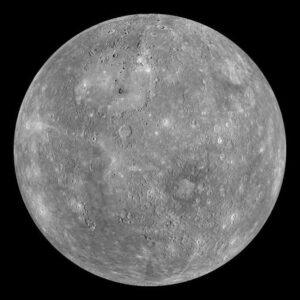*This post may contain affiliate links. This means we may make a commission if you purchase an item using one of our links*
If you’re aware of the placement of each planet within our solar system I’m sure you’d be know that the closest planet to our Sun is in fact Mercury however, what may surprise you is that it isn’t the hottest planet within our solar system, the hottest planet is in fact Venus.
The main reasons why are because unlike Venus, Mercury doesn’t have an atmosphere therefore, it cannot trap heat from the Sun and it’s rate of reflectiveness is much lower than Venus too which makes it harder to maintain heat levels comparable to Earth’s so called sister planet.
Of course I’ll go over the details more thoroughly throughout this article to help you understand in more detail why Mercury is not the hottest planet in our solar system.
How Hot Is Mercury?
Table of Contents
At its hottest Mercury has been recorded to have achieved a maximum temperature of 427 degrees Celsius (801 Fahrenheit) whilst at its coldest it can achieve a bone shatteringly cold -180 Degrees Celsius (290 Fahrenheit).
Venus on the other has achieved a max temperature of 477 Degrees Celsius (891 Fahrenheit) with a low of around 460 degrees celsius (860 Fahrenheit) which simply means its blazing hot every minute of its extremely extremely long day (1 Day in venus is equal to 116.75 days in earth days).
On average Venus is over 30 Degrees Celsius (86 Fahrenheit) hotter than Mercury’s max temperature, which is pretty darn insane when you consider it’s 108 million km away from the Sun compared to Mercury’s 58 million km.
The Reasons Why Mercury Isn’t The Hottest Planet

There are 2 main reasons why Mercury is not the hottest planet within our solar system despite it being much closer to the Sun than Venus ever is within its orbital cycle. The first reason is of course due to the lack of an atmosphere within Mercury and the second reason is due to the differences on both planets absorption and reflective rates.
Reason 1 – It Has No Atmosphere
The most obvious reason why Mercury isn’t the hottest planet in our solar system is due to its lack of an atmosphere. Venus on the other hand has an extremely thick atmosphere which means that not only is it an extremely reflective planet (I’ll explain why in the next reason) but, it’s also capable of trapping heat within its atmosphere allowing it to increase the surface temperature of the planet further.

In most cases when a planet is done absorbing as much light as it can, the light re-radiates back into outer space so, the lack of an atmosphere makes it pretty simple for Mercury to follow through with this process.
However, because Venus’ atmosphere is so thick (roughly 100 times that of earth) the re-radiation process is literally hundreds of times harder as a lot more heat is trapped within. This is further amplified by the fact Venus’ atmosphere has huge amounts of infrared absorbing gases like carbon dioxide which is shrouded in thick reflective clouds.
When all of these factors are taken into. account, it does make sense why Venus is generally hotter.
Reason 2 – It’s Absorption Rate Is Much Higher Than Venus
Due to the lack of an atmosphere, the heat and light that travels from the Sun to Mercury cannot actually be trapped on the planet and is instead absorbed. This is known as a planets albedo.
In short the albedo rating spans from 0 – 1 with 0 labeling an object as having the perfect rate of absorption and a rating of 1 meaning the object is a perfect reflector.
Mercury’s albedo rating is actually very similar to the moon at 0.119 (with the Moons rating being 0.12). This means that for Mercury a little under 12% of the light that travels from the Sun to it is reflected and 88% of the heat is absorbed.
Venus on the other hand has an albedo rating of 0.75, which is in fact the highest rating within our solar. This is also one of the reasons why it’s the brightest planet within our solar system too.
Generally, most people would assume that Mercury is the hottest planet purely because it’s much closer to the sun than Venus, with Venus being roughly 2 times the distance away.
However, due to Venus’ extremely reflective nature, when the light hits its surface, 75% of all light reflects back out. Even though this energy is meant to re-radiate back out of Venus, in reality and as a result of the 20km thick acidic atmosphere, a good portion of the reflective energy gets trapped within the atmosphere.
What this does is cause the heat within Venus to rise as opposed to lowering like what should be expected of reflective planets. Therefore, even if you take into account Mercury absorbing more energy, which should technically result in it being hotter, Venus having the extremely dense atmosphere coupled with said atmosphere trapping the re-radiated light within causes Venus to be hotter than Mercury pretty much year round.
Summary
So, the 20km thick and dense atmosphere coupled with said dense atmosphere causing 75% of the reflected re-radiated light to be absorbed into itself are the 2 main reasons why Venus is as hot as it is and is what ultimately makes it the hottest planet in our solar system.
Mercury definitely isn’t a slouch when it comes to being hot piece of rock but, it’s far from Venus’ match.


The article explains the phenomenon well. Would be nice if some of the repetitions were removed.
Also, some Celsius and Fahrenheit conversions don’t appear to be correct – maybe in some instances you meant Kelvin and Rankine.
Cheers for the comment, yeah I’ll clear up the inconsistencies so it reads better for sure!
I don’t understand your reason 2. First of all, you state an albedo of 0.0119 for Mercury (0.012 for the Moon). This is 1.2% and not 12%. Other websites list Mercury’s albedo as ~ 0.12 or ~12%, which agrees with your statement that Mercury reflects 12% of the solar radiation and absorbs 88%. You then state that Venus’ albedo is 0.9, which means that planet reflects 90% of the solar radiation and absorbs 10%. So Mercury’s absorption rate (88%) is higher than Venus’ (10%). That suggests Mercury should be hotter than Venus. In reality the opposite is true. Either you’re not explaining this well or absorption is not one of the reasons Venus is hotter than Mercury.
Good point.
I might’ve mixed up the numbers there so I’ll sort it out as well as restructure the reason to make sure it makes more sense